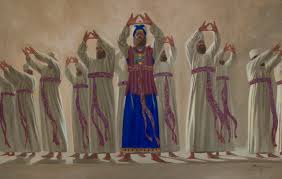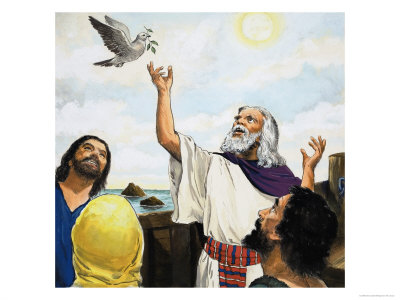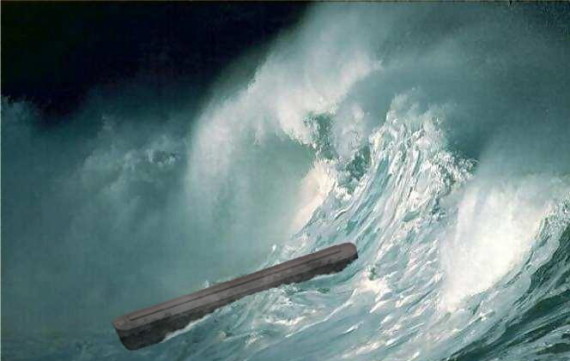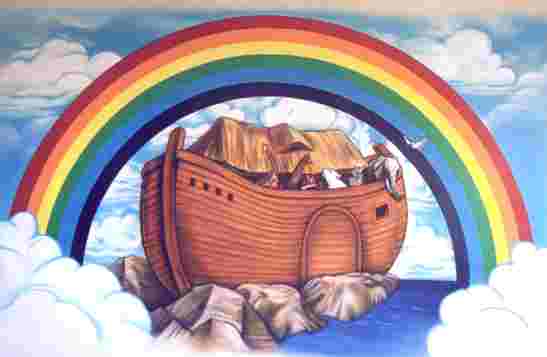Genesis 9:18- Genesis 10
Session 4: Week 7 – Genesis 9:18 – Genesis 10
18 Now the sons of Noah who went out of the ark were Shem, Ham, and Japheth. And Ham was the father of Canaan. 19 These three were the sons of Noah, and from these the whole earth was populated.
Shem: name; renown
Ham: hot; heat; brown
Japeth: enlarged; fair; persuading
20 And Noah began to be a farmer, and he planted a vineyard. 21 Then he drank of the wine and was drunk, and became uncovered in his tent. 22 And Ham, the father of Canaan, saw the nakedness of his father, and told his two brothers outside. 23 But Shem and Japheth took a garment, laid it on both their shoulders, and went backward and covered the nakedness of their father. Their faces were turned away, and they did not see their father’s nakedness.
24 So Noah awoke from his wine, and knew what his younger son had done to him. 25 Then he said: “Cursed be Canaan; A servant of servants He shall be to his brethren.”
26 And he said: “Blessed be the Lord, The God of Shem, And may Canaan be his servant. 27 May God enlarge Japheth, And may he dwell in the tents of Shem; And may Canaan be his servant.”
28 And Noah lived after the flood three hundred and fifty years. 29 So all the days of Noah were nine hundred and fifty years; and he died.
This story is a foreshadow of commandment #5 in God’s 10 Commandments Exodus 20:12 12 “Honor your father and your mother, that your days may be long upon the land which the Lord your God is giving you.
The first 4 commandments are about man’s relationship with God and the last 6, man’s relationship to man. These apply to everyone on earth. Let’s be reminded of them.
The 10 Commandments List
- You shall have no other gods before Me.
- You shall not make idols.
- You shall not take the name of the LORD your God in vain.
- Remember the Sabbath day, to keep it holy.
- Honor your father and your mother.
- You shall not murder.
- You shall not commit adultery.
- You shall not steal.
- You shall not bear false witness against your neighbor.
- You shall not covet.
What are your thoughts about following the 10 commandments? John 14:15
The 10 Commandments are a great tool to use in sharing your faith with people. I’ll put a link in this week’s resources introducing you to a ministry called “Living Water – Way of the Master” and you can see how they use the 10 commandments as a great evangelism tool.
Genesis 10
10 Now this is the genealogy of the sons of Noah: Shem, Ham, and Japheth. And sons were born to them after the flood.
2 The sons of Japheth were Gomer, Magog, Madai, Javan, Tubal, Meshech, and Tiras. 3 The sons of Gomer were Ashkenaz, Riphath, and Togarmah. 4 The sons of Javan were Elishah, Tarshish, Kittim, and Dodanim. 5 From these the coastland peoples of the Gentiles were separated into their lands, everyone according to his language, according to their families, into their nations.
6 The sons of Ham were Cush, Mizraim, Put, and Canaan. 7 The sons of Cush were Seba, Havilah, Sabtah, Raamah, and Sabtechah; and the sons of Raamah were Sheba and Dedan. 8 Cush begot Nimrod; he began to be a mighty one on the earth. 9 He was a mighty hunter before the Lord; therefore it is said, “Like Nimrod the mighty hunter before the Lord.” 10 And the beginning of his kingdom was Babel, Erech, Accad, and Calneh, in the land of Shinar. 11 From that land he went to Assyria and built Nineveh, Rehoboth Ir, Calah, 12 and Resen between Nineveh and Calah (that is the principal city). 13 Mizraim begot Ludim, Anamim, Lehabim, Naphtuhim, 14 Pathrusim, and Casluhim (from whom came the Philistines and Caphtorim). 15 Canaan begot Sidon his firstborn, and Heth; 16 the Jebusite, the Amorite, and the Girgashite; 17 the Hivite, the Arkite, and the Sinite; 18 the Arvadite, the Zemarite, and the Hamathite. Afterward the families of the Canaanites were dispersed. 19 And the border of the Canaanites was from Sidon as you go toward Gerar, as far as Gaza; then as you go toward Sodom, Gomorrah, Admah, and Zeboiim, as far as Lasha. 20 These were the sons of Ham, according to their families, according to their languages, in their lands and in their nations.
21 And children were born also to Shem, the father of all the children of Eber, the brother of Japheth the elder. 22 The sons of Shem were Elam, Asshur, Arphaxad, Lud, and Aram. 23 The sons of Aram were Uz, Hul, Gether, and Mash. 24 Arphaxad begot Salah, and Salah begot Eber. 25 To Eber were born two sons: the name of one was Peleg, for in his days the earth was divided; and his brother’s name was Joktan. 26 Joktan begot Almodad, Sheleph, Hazarmaveth, Jerah, 27 Hadoram, Uzal, Diklah, 28 Obal, Abimael, Sheba, 29 Ophir, Havilah, and Jobab. All these werethe sons of Joktan. 30 And their dwelling place was from Mesha as you go toward Sephar, the mountain of the east. 31 These were the sons of Shem, according to their families, according to their languages, in their lands, according to their nations.
32 These were the families of the sons of Noah, according to their generations, in their nations; and from these the nations were divided on the earth after the flood.
Moses, the author of the book of Genesis, was making a point that explained later conflicts in the Bible. Descendants of Shem and Japheth might be allies, but Ham’s people became enemies of the Shemites, (i.e. the Egyptians and Philistines).
It’s amazing that we can trace all the peoples of the earth to these 3 sons of Noah. This genealogy is unique in that rather than just a family tree listing who fathered whom, it details descendants “by their clans and languages, in their territories and nations.”
Remember from our study in Genesis 6:8-22 that Shem is always mentioned first e.g., Genesis 9:18; 10:2, 21, even though Shem was the second-born (the Bible often lists people according to prominence rather than age). Japheth was the oldest Genesis 10:21, and Ham was the youngest Genesis 9:24. Here’s why – I think: Eber, meaning “the other side,” is mentioned in the Table as a great-grandson of Shem. The term “Hebrew,” which originates from Eber, describes a people who came from the other side of the Euphrates River, from Haran. And so in the next session of our Bible study in Genesis we’ll be introduced to Abram, who left Haran to become Abraham, father of the Jewish nation, which produced the promised Savior, Jesus Christ.
Japheth is usually thought of as the “Father of the Europeans” and the “Father of the Japhetic Race” equating the Japhetic nations to Europeans. He is known to be the ancestor of all Indo-European nations. The majority of his descendants are situated in north western regions like Anatolia and Aegean. However, there are also assumptions that Japheth is the “Father of the Asian or Mongoloid People.”
The Pre-Flood home of Noah and his family was in the area of Babylonia which was some 500 miles east from Mount Ararat, in what is today modern Turkey. After the flood they migrated back to their homeland and built cities. God then caused the confusion of languages which caused them to disperse into the world.
Genesis 10:2-5
The descendants of Japheth, after the Tower of Babel, when God made man go out and populate the world migrated west and north. The sons of Japheth’s sons are listed giving more detail than is found in the list of Ham’s or Shem’s sons. A study of names Japheth’s sons and grandsons sheds some light on who are his descendants today.
| Name of the Son | People Associated With the Name |
| Japheth | Greeks, Aryans of India |
| Gomer | People living in area of the Black Sea, Germany and Wales. |
| Magog | Reference to “Gog” referring to Georgia, a region near the Black Sea and Scythians. |
| Madai | Medes (Persia), Japheth through Madai father of peoples of India. |
| Javan | People of Greece and Cyprus. |
| Tubal | Russian, city of Tobolsk. |
| Meshech | Russian, (Name Muskovi) city of Moscow. |
| Tiras | Thracians, possibly the Etruscans of Italy. |
| Ashkenaz | Germany, Armenia, Scandinavia, Denmark, northern islands of Europe and European west coast. |
| Ripath | Generally Europe, Carpathians and Paphlagonians |
| Togarmah | Armenians, Germany and Turkey |
| Elishah | Greeks (“Hellas” is a form of word Elishah) |
| Tarshish | Spain, Carthage in North Africa |
| Kittim | Greeks, Cyprus, Macedonia |
| Dodanium | Greeks, Rhodes, Dardanelles |
(The above information came from Henry M. Morris’s book The Genesis Record, pages 247-249)
What thoughts do you have about these divisions of the nations from Genesis 10?
Let’s pray.
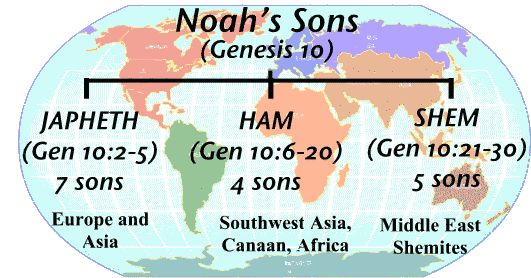
OTHER RESOURCES OF INTEREST
Using the 10 commandments for witnessing

